59 Search Results for aac and aphasia
July 18, 2022
by Carole Zangari -
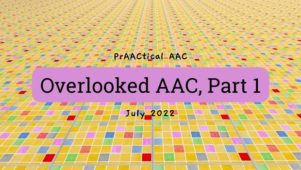
Whether you are a therapist, educator, or other professional there is a long list of things that people who use AAC need us to do so that they can communicate in ways that help them live their best lives. Today, we begin a series on some of the most overlooked areas that even veteran AAC practitioners often miss. Not because they don’t know about them. Not because they have a philosophical reason to avoid them. Not because they can’t figure out how to implement them. But because there are incredibly frustrating systemic obstacles to providing the kinds of support our clients/students need. In schools, caseload and classroom sizes stack the deck against us. In healthcare settings and private clinics, the funding streams steer us away from a best practice approach. And in almost every setting, the increasing paperwork and organizational demands draw our attention away from what we want to... [Read More...]
June 19, 2022
by Carole Zangari -
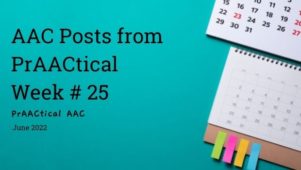
Happy Sunday, AAC friends, and Happy Father’s Day to those who are celebrating. In the US, it is Juneteenth, a day of commemoration of the emancipation of enslaved African Americans. Whether this is a time for celebration or thoughtful reflection in your household, we wish you well. If you have a little extra time and energy, we have some AAC posts for you to browse through. Monday – AAC-friendly Resources for Juneteenth Tuesday – AAC Link Up Wednesday – Video of the Week: AAC & Aphasia Thursday – Throwback Thursday: AAC Assessment & Intervention for People with Aphasia :::::::::::::::::::::::::::::::::::::::::::::::::::::::::::::::::::::::::::::::::::::::::::::::::::::::::::::::::::: Still have an appetite for AAC? Here are a handful of past posts to browse. Faces of AAC: Making It Work in a Busy Family PrAACtically Reading with Karen Natoci: The Family Book Family Collaboration by Dr. Barry Prizant From Presence to Contribution: A Family’s Journey Toward and Inclusive Life From... [Read More...]
June 16, 2022
by Carole Zangari -
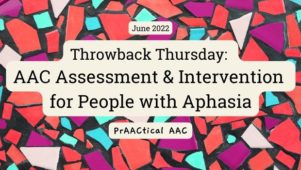
June is Aphasia Awareness Month, so we’re reprising some past articles and videos on supporting people with aphasia through AAC. When Language Is Lost: AAC Supports for Individuals with Aphasia Making It Work: 6 AAC Strategies for People with Aphasia Low Tech AAC for Adults with Aphasia: What Does That Mean? Bridging the Gap: Helping People with Aphasia to Compensate for Their Language Difficulties Aphasia, Supported Communication, Written Choice Strategy, + Variations 5 Questions about Aphasia & Communication Books A Fresh Look at AAC & Aphasia with Dr. Kristy Weissling Communication Books & Aphasia Aphasia & Supported Communication: What’s Volunteering Got to Do With It? AAC Assessment for People with Aphasia AAC & Aphasia: Resources in Support of National Aphasia Awareness Month Video of the Week: Life Participation & AAC Device Personalization for Adults with Aphasia Video of the Week: AAC & Aphasia
June 15, 2022
by Carole Zangari -
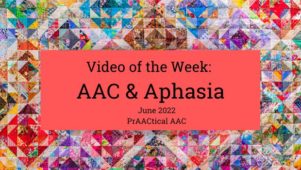
In recognition of Aphasia Awareness Month, we’re pleased to feature this recorded presentation on AAC and Aphasia by SLP Katie Threlkeld from Forbes AAC. Many thanks to them both for sharing this helpful information. Enjoy! Direct link to video – https://www.youtube.com/watch?v=ChKpuTHCDL0&ab_channel=ForbesAAC
June 27, 2021
by Carole Zangari -
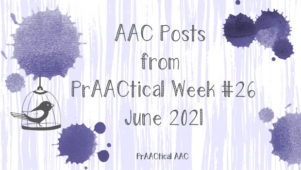
Happy Sunday, AAC friends. We have some posts that you might have missed. Monday – AAC in Secondary School: AACcessibility during Community Based Instruction Tuesday – AAC Link Up Wednesday – Video of the Week: AAC Apps for Visual Scene Displays Thursday – PrAACtically Reading: Books Featuring Children & Youth with Disabilities (Updated) :::::::::::::::::::::::::::::::::::::::::::::::::::::::::::::::::::::::::::::::::::::::::::::::::::::::::::::::::::::::::::: Before you go, take a look and see if any of these are of interest. AAC Assessment Forms AAC Printables & Downloads AAC Assessment for People with Aphasia Book Adaptations: Resources and Materials 5 Ways to Use Books to Build Interaction with AAC Learners
June 13, 2021
by Carole Zangari -
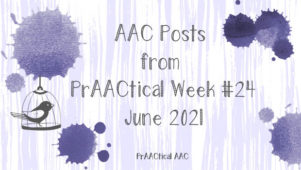
Happy Sunday, AAC friends. Here are a few posts you may have missed. Monday – Growing AAC Professionals: AACessible Literacy: Emergent Literacy Resources for the AAC SLP Tuesday – AAC Link Up Wednesday – Video of the Week: Life Participation & AAC Device Personalization for Adults with Aphasia Thursday – Throwback Thursday: Summertime AAC ::::::::::::::::::::::::::::::::::::::::::::::::::::::::::::::::::::::::::::::::::::: If you have a few more minutes, stick around and explore some more. From Activity-based AAC to Robust Language Activity Schedule AACtion AACtual Therapy with Jeanne Tuthill: An Informal Assessment Activity A PrAACtical Literacy Activity for Beginning Communicators 10 Posts on Activity Ideas for Language Therapy with AAC
June 9, 2021
by Carole Zangari -
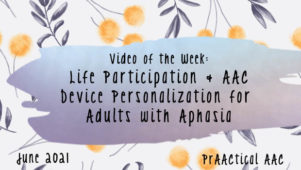
Here in the US, June is the month that we use to build awareness of and support for people with aphasia. Today’s video is from the AAC in the Cloud Conference, hosted by CoughDrop, and features the work of SLPs Amanda Gunn and Caitlin Mueller. We are grateful to CoughDrop and the presenters for making their work readily available. You can obtain the handouts for this session here. Enjoy! Direct Link to Video – https://www.youtube.com/watch?v=6cJuqi95ctI&ab_channel=CoughDrop
January 11, 2021
by Carole Zangari -
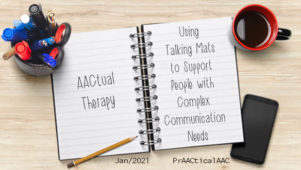
Talking Mats, a powerful tool for helping people with complex needs share their thoughts and advocate for themselves, is a topic we’ve posted about before. Today, we expand that discussion and learn from SLT Katherine Small, an AAC Consultant at the Ace Centre. In the first of a 2-part series, Katherine shares her experience in implementing Talking Mats with her clients. Enjoy! My Experience as a Practitioner who Uses Talking Mats Before training as an SLT, I had a variety of jobs where supporting people to share their views was key. One of the tools I used was ‘In My Shoes’ and I knew how helpful such tools were when I was trying to make sure I gave clients space to think and a means of expression during important conversations. So when I heard about Talking Mats I knew straight away that it would suit my style of working &... [Read More...]
September 10, 2020
by Carole Zangari -
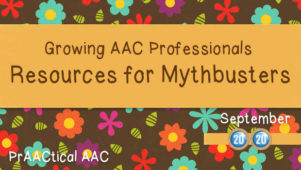
We’re excited to have another guest post today by Vicki Haddix, an AAC SLP and Clinical Assistant Professor at the University of Memphis. Vicki joins us periodically to share some of the work completed by her SLP graduate students. Under her leadership, they create videos, handouts, and other materials that can be used by families, clinicians, and educators. Let’s take a look. ::::::::::::::::::::::::::::::::::::::::::::::::::::::::::::::::::::::::::::::::::::::::::::::::::::::::::::::: As I have said in previous posts about teaching the graduate class on AAC, I find Universal Design for Learning (UDL) to be a very helpful framework when designing the course, although I’ve realized I don’t typically name UDL when I discuss activities or assignments. But I was thrilled when Lindsey Hull came to me wanting to look at integrating students who use AAC within the general education classroom, and we got to talk about UDL. She put together a narrated PowerPoint full of great ideas for... [Read More...]
October 7, 2019
by Carole Zangari -
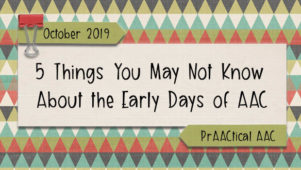
Given that October is AAC Awareness Month we thought that some of you AAC lovers would appreciate a stroll down memory lane. Here are a few things you may not know about the early days of AAC. The first papers that focused on AAC intervention were published in the 1950’s. In 1952, Goldstein and Cameron wrote about their use of communication boards with people with aphasia, and, a few years later, Sklar and Bennett discussed their experiences in using communication charts with this same population. Toward the end of the decade, professionals began describing their efforts in using communication boards with people with physical disabilities (e.g., Feallock,1958; Goldberg & Fenton, 1960). While speech-language pathologists and occupational therapists were among the first to disseminate their AAC work, professionals from many backgrounds contributed to its growth. In the early days, some of the strongest contributors to the field of AAC were rehabilitation... [Read More...]









